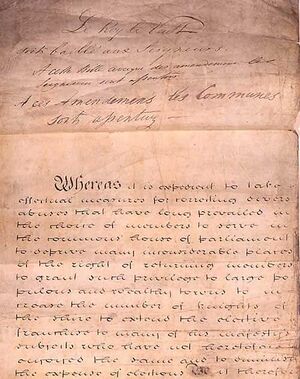Reform Act 1832 (nonfiction): Difference between revisions
No edit summary |
|||
| (4 intermediate revisions by the same user not shown) | |||
| Line 1: | Line 1: | ||
The '''Representation of the People Act 1832''' (known informally as the '''1832 Reform Act''', '''Great Reform Act''' or '''First Reform Act''' to distinguish it from subsequent Reform Acts) was an Act of Parliament | [[File:Reform_Act_1832.jpg|thumb|First page of the Reform Act of 1832. The record of the king's royal assent is written above the bill and reads in full: ''Le Roy Veult soit baillé aux Seigneurs. A cette Bille avecque des amendemens les Seigneurs sont assentuz. A ces Amendemens les Communes sont assentuz''.]]The '''Representation of the People Act 1832''' (known informally as the '''1832 Reform Act''', '''Great Reform Act''' or '''First Reform Act''' to distinguish it from subsequent Reform Acts) was an Act of Parliament which introduced wide-ranging changes to the electoral system of England and Wales. | ||
The Act was championed by [[Charles Grey, 2nd Earl Grey]]. | |||
According to its preamble, the Act was designed to "take effectual Measures for correcting divers Abuses that have long prevailed in the Choice of Members to serve in the Commons House of Parliament". | According to its preamble, the Act was designed to "take effectual Measures for correcting divers Abuses that have long prevailed in the Choice of Members to serve in the Commons House of Parliament". | ||
| Line 7: | Line 7: | ||
Before the reform, most members nominally represented boroughs. | Before the reform, most members nominally represented boroughs. | ||
Frequently the selection of MPs was effectively controlled by one powerful patron: for example Charles Howard, 11th Duke of Norfolk controlled eleven boroughs. | |||
== In the News == | |||
<gallery mode="traditional"> | |||
</gallery> | |||
== | == Fiction cross-reference == | ||
The | * ''[[The Adulteration of Bergamot]]'', a lost erotic novel by [[Charles Grey, 2nd Earl Grey (nonfiction)]] | ||
== Nonfiction cross-reference == | == Nonfiction cross-reference == | ||
| Line 21: | Line 22: | ||
* [[Charles Grey, 2nd Earl Grey (nonfiction)]] | * [[Charles Grey, 2nd Earl Grey (nonfiction)]] | ||
External links: | |||
* [https://en.wikipedia.org/wiki/Reform_Act_1832 Reform Act 1832] @ Wikipedia | * [https://en.wikipedia.org/wiki/Reform_Act_1832 Reform Act 1832] @ Wikipedia | ||
Latest revision as of 19:01, 24 June 2016
The Representation of the People Act 1832 (known informally as the 1832 Reform Act, Great Reform Act or First Reform Act to distinguish it from subsequent Reform Acts) was an Act of Parliament which introduced wide-ranging changes to the electoral system of England and Wales.
The Act was championed by Charles Grey, 2nd Earl Grey.
According to its preamble, the Act was designed to "take effectual Measures for correcting divers Abuses that have long prevailed in the Choice of Members to serve in the Commons House of Parliament".
Before the reform, most members nominally represented boroughs.
Frequently the selection of MPs was effectively controlled by one powerful patron: for example Charles Howard, 11th Duke of Norfolk controlled eleven boroughs.
In the News
Fiction cross-reference
- The Adulteration of Bergamot, a lost erotic novel by Charles Grey, 2nd Earl Grey (nonfiction)
Nonfiction cross-reference
External links:
- Reform Act 1832 @ Wikipedia

